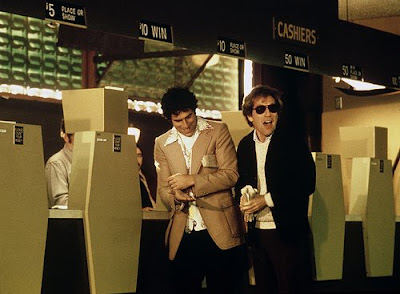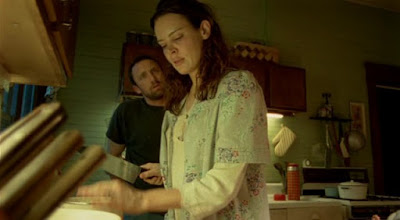 Charlie (Elliot Gould) and Bill (George Segal) meet among accusations of cheating in a chaotic LA cardroom and bond over drinks, silly prop bets, and a mugging. Bill--an actual, productive member of society and only a casual gambler--is both fascinated and horrified by Charlie's life, with his call-girl roommates, petty ripoffs, and morning beer. Soon of course he's hiding from his boss, joining Charlie at the track, and getting in bad with his bookie. Two things really carry this movie through its desultory plot: First is Gould's great Altman chemistry--he owns the screen as a colorful, slightly menacing whirlwind, playing a character that is apparently about 80% Gould. Second is the sense of euphoric claustrophobia: Altman accomplishes this in part through his blanket of dialogue (in eight-track stereo!), which captures the non-stop and even oppressive hubbub of casinos and similar places; but he also puts together some great shots (Bill, giddy as if he's calling a new crush, gets off the phone with Charlie and gets a little tangled in the cord; Bill and one of the girls try to get undressed on a couch), where excitement, cramped quarters, and slightly oppressive close-ups combine into a great representation of the discomfort and thrill of out-of-control gambling.
Charlie (Elliot Gould) and Bill (George Segal) meet among accusations of cheating in a chaotic LA cardroom and bond over drinks, silly prop bets, and a mugging. Bill--an actual, productive member of society and only a casual gambler--is both fascinated and horrified by Charlie's life, with his call-girl roommates, petty ripoffs, and morning beer. Soon of course he's hiding from his boss, joining Charlie at the track, and getting in bad with his bookie. Two things really carry this movie through its desultory plot: First is Gould's great Altman chemistry--he owns the screen as a colorful, slightly menacing whirlwind, playing a character that is apparently about 80% Gould. Second is the sense of euphoric claustrophobia: Altman accomplishes this in part through his blanket of dialogue (in eight-track stereo!), which captures the non-stop and even oppressive hubbub of casinos and similar places; but he also puts together some great shots (Bill, giddy as if he's calling a new crush, gets off the phone with Charlie and gets a little tangled in the cord; Bill and one of the girls try to get undressed on a couch), where excitement, cramped quarters, and slightly oppressive close-ups combine into a great representation of the discomfort and thrill of out-of-control gambling.Eventually, Bill is in deep enough that he gives it all over to a hunch: he has a "special feeling" and hocks all his possessions, and he and Charlie head to Reno for a high-stakes poker game. Bill goes on a heater and crushes the game (including Amarillo Slim); he takes his winnings to blackjack and roulette and craps; and we find ourselves watching the fable and wondering how it will crash down around them. A comedy (less for its laughs than its temperament) about the absurdity and pathos of gamblers becomes, in a matter of seconds, an understated, tense meditation on chance, expectation, and superstition.
This is a neat film to remind you what you like about "major" Altman--the bemused horror at Americana, the crush of people and lives, the setting as character. It is also a good film to remind you about the difference between confidence and luck, and the dangers of confusing the two.
[Photo: Egyptian Femme! EGYPTIAN FEMME!]


